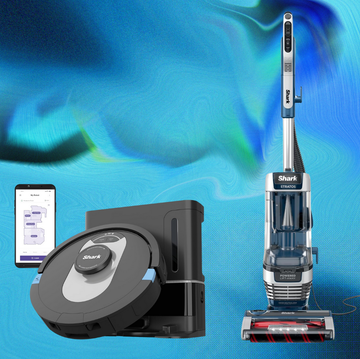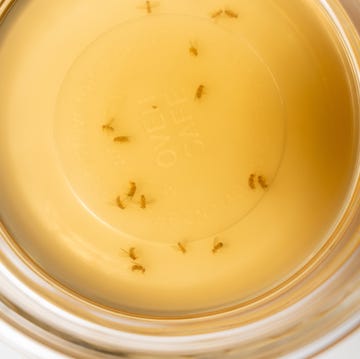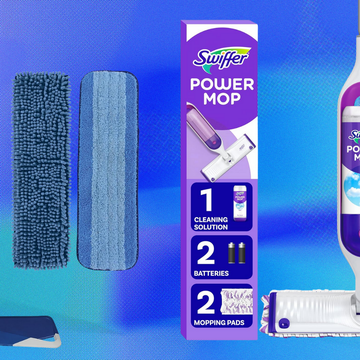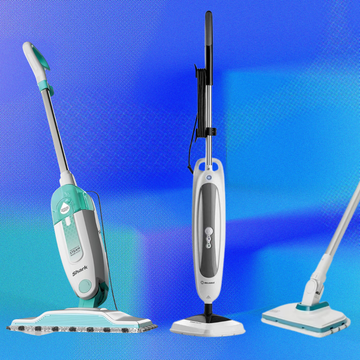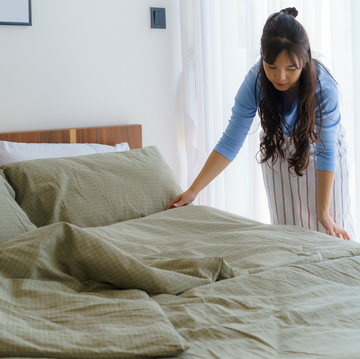Jump to:
- How long is the flea life cycle?
- Can I get rid of fleas right away?
- How long does it take to get rid of fleas in the house?
- How to get rid of fleas in your home
- How to get rid of fleas in the bed
- How to get rid of fleas on dogs, cats and other pets
- How to get rid of fleas in the yard
- Can fleas live on humans?
- The bottom line
If your furry friend has fleas, chances are they’ve already brought them into your yard and inside your home. While there’s no need to panic at the first sign of fleas, acting quickly and efficiently is the best way to get rid of these pests before an infestation occurs. To help you get started, we’ve created an all-inclusive guide with everything you need to know about fleas and how to get rid of them in your home.
Unfortunately, these tiny insects don’t always just affect pets — they can also carry pathogens that cause human disease, according to the Centers for Disease Control and Prevention (CDC). That’s why it’s so important to tackle a flea problem right away.
We spoke with Michael Bentley, an entomologist and the director of training and education for the National Pest Management Association (NPMA), and Josh Matta, entomologist and senior biologist for Spectrum Garden Brands, to learn more about getting rid of these pests once and for all.
How long is the flea life cycle?
The flea life cycle is dependent on environmental conditions, according to the CDC. Once a flea finds a host, adult fleas will mate and lay eggs. The speed of development of these eggs depends on its surrounding conditions. That being said, adult fleas will not emerge until there is a sign of a host. Once they hatch, adult female fleas will begin feeding from their hosts and will continue the cycle of mating and laying eggs.
Because the flea life cycle is dependent on its surrounding, some pests may go through their life stages in a matter of weeks while others take a few months or even years.
Can I get rid of fleas right away?
Because fleas have such an unpredictable life cycle, it can take some time and persistence to completely eradicate these pests. While you may think you’ve gotten rid of all the fleas in your home, there may be some unhatched insects waiting for the ideal conditions to emerge. That’s why it’s so important to continue to treat your pets and home even after you think the fleas are gone.
How long does it take to get rid of fleas in the house?
Completely eliminating fleas from your home can take weeks or even months. To effectively get rid of fleas, Matta suggests a simultaneous multistep approach, which means thoroughly inspecting and treating the home, yard and pets. “Flea prevention and treatment go hand-in-hand, so it is important to tackle both," he says.
How to get rid of fleas in your home
- Sweep and vacuum furniture, carpeted areas and floors, especially where they meet the walls. “Flea larvae are usually located in undisturbed locations such as along baseboards, in the seams of furniture and inside the cracks of floors,” says Bentley. Just make sure to empty the dust bag or dust cup of the vacuum afterwards.
- Wash bedding such as blankets and pet beds, especially those placed near those undisturbed areas where fleas frequently breed. If the infestation is severe, you may want to consider throwing out the bedding and replacing it.
- Use hot water to launder any cleaning cloths and make sure to dry on high heat. Doing so will help kill any fleas that may have attached themselves in the cleaning process.
- Steam soft surfaces like mattresses, upholstery and carpeting with a household steamer. The heat will help kill fleas hidden deep within carpets and other hard-to-reach areas. However, it's still necessary to work with professionals.
- Treat your home. Bentley says it’s critical to work with a pest control professional to get rid of fleas properly and effectively. A commercial pest control professional can also help determine which products are best to treat your home and yard.
- Repeat treatments and cleaning. Fleas have a complex life cycle, which means it can take weeks or even months to completely get rid of them. You’ll want to follow the schedule of treatments given by your pest control professional. It's also best to repeat vacuuming and continue to wash bedding frequently to get rid of flea larvae and eggs.
How to get rid of fleas in the bed
If pets have been in or around your bed, there's a chance fleas may be there as well. In addition to laundering any bedding and pillows that are safe to wash, steam the mattress and vacuum the entire bed: the bed frame, mattress and box springs. You’ll also want to thoroughly vacuum the floors underneath.
How to get rid of fleas on dogs, cats and other pets
If you see red bumps or hair loss on your pet (cats included!) or notice them scratching frequently, that could be a sign that they have fleas — and that you have fleas in your house. Bathe your pets with a shampoo your veterinarian approves, and use a flea comb, especially around your pet's face and neck and near the base of the tail.
It's a good idea to speak with your veterinarian about flea and tick prevention before having to deal with an infestation. Most flea treatments and shampoos for pets carry insecticides like pyrtherins, which can be dangerous to their health depending on the species and/or if not used properly. If your pet is on a flea shampoo or treatment schedule, please report any unusual side effects to your vet or pet poison hotline immediately.
How to get rid of fleas in the yard
In order to prevent fleas from traveling indoors on pets, it’s best to regularly treat your yard with an insect control product designed to eliminate fleas. Matta recommends the brand he represents, Ecologic’s Lawn & Yard Insect Killer, which uses mint oil and geraniol as actives that are considered minimum-risk pesticides. “I recommend this product because it is safe to use around children and pets," he says. "It kills ants, fleas, ticks and more, and can be used on lawns, landscapes and around home foundations."
Can fleas live on humans?
Fleas do not typically live on humans; they prefer animal hosts. However, according to Bentley, they will resort to biting people when animals are unavailable and can then readily return to pets.
The bottom line
Fleas will not go away naturally. “An infestation without any treatment will be a long and ongoing battle for homeowners," says Bentley. "It is best to work with a pest control professional to eradicate an infestation before it becomes a larger health concern for you, your home and your pets.”
Jamie Ueda is a consumer products expert with over 17 years of experience in areas of product development and manufacturing. She has held leading roles at both mid-size consumer goods companies and one of the most notable and largest apparel brands in the world. Jamie has contributed to several of the GH Institute Labs, including Kitchen Appliances, Media and Tech, Textiles and Home Appliances. In her free time she enjoys cooking, traveling, and working out.
Laura Millar (she/her) is the assistant lifestyle editor for Good Housekeeping, where she covers home design. Prior to joining Good Housekeeping in 2024, she wrote for NBC's TODAY.com, where she covered everything from entertainment news to pop culture updates.




